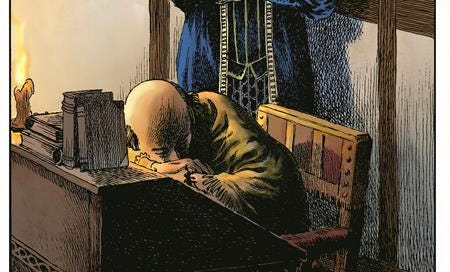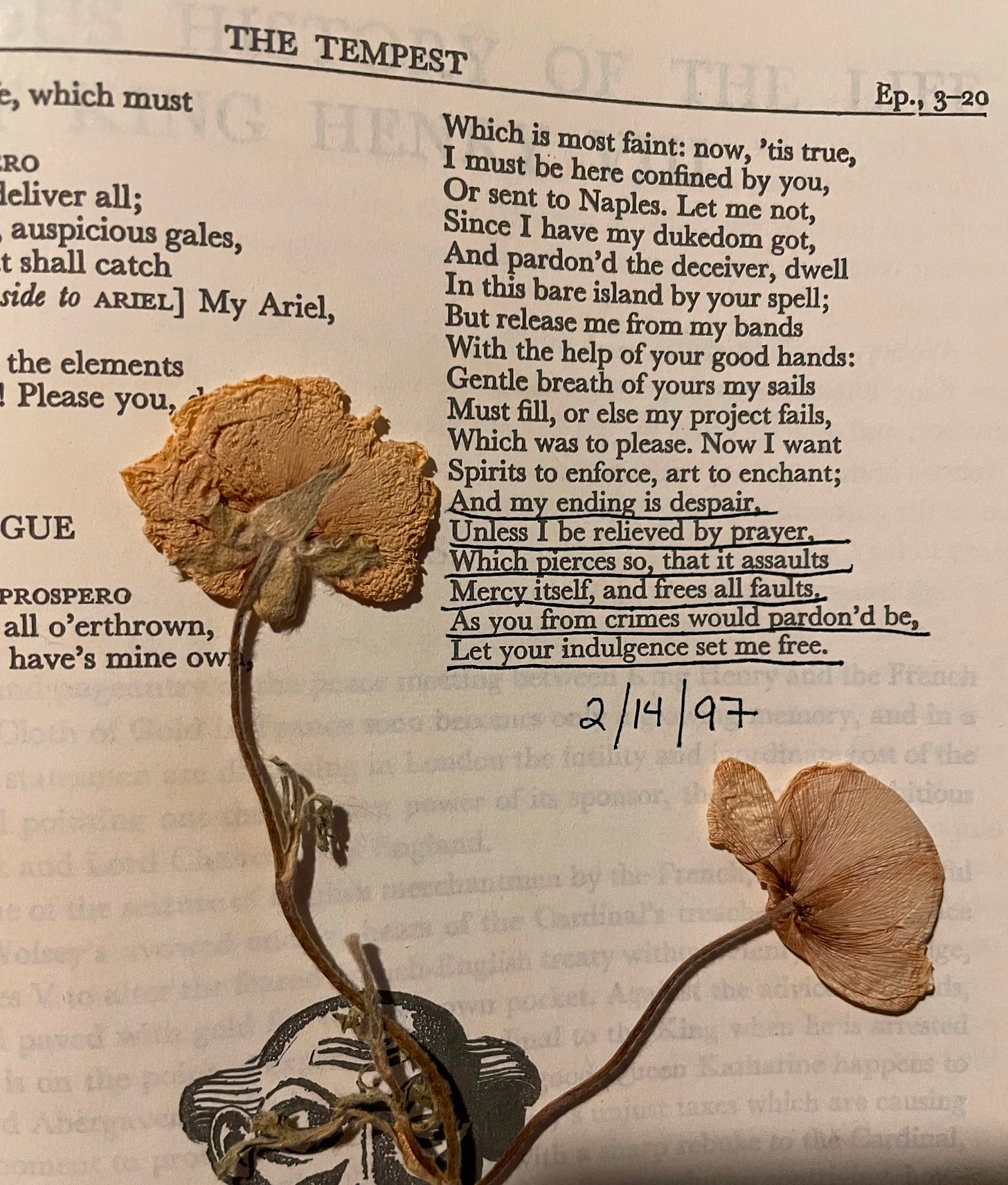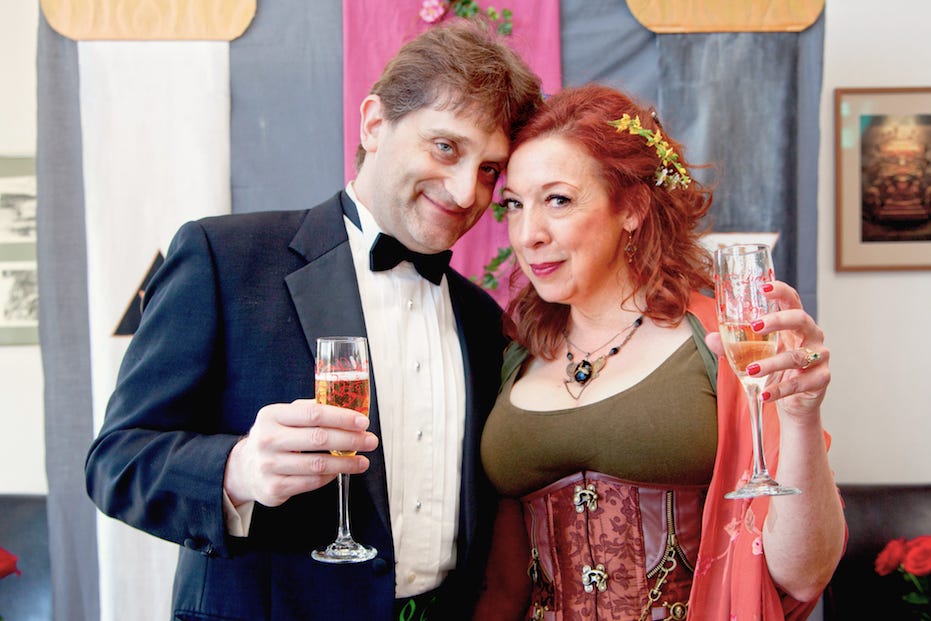“When the wolves come out of the walls, it’s all over.”
— The Wolves in the Walls by Neil Gaiman
I first “met” Neil Gaiman on March 26, 1996 when I was living in San Jose, CA.
“But how?” you may ask. The answer might make you uncomfortable. If you know me, I hope you won’t think less of me for it. Because this isn’t fiction. What I’m about to tell you is real.
It was a little like Griffin & Sabine but in real life. In Nick Bantock’s fictional story, Sabine seems to have a mysterious connection to a man named Griffin of whom she’s dreamed for 13 years. She has startling, unexplained insights into what he’s creating. Things only he can know. And yet they’ve never met. The two exchange postcards in their epistolary tale.
I had been dreaming about a man I’d never met since I was 13 years old. He appeared in different time periods, some modern, and sometimes he looked a bit different, but he was always the same person. I could tell because there was something similar about his eyes.
It wasn’t until many years later in 1994, when I was struggling with family issues, that I decided to see a therapist. She started hypnotizing me to find the source of my problems. In the hypnosis sessions, I learned the name of the man in my dreams was “Richard.”
A series of profound synchronistic events led me to see Neil speak on Halloween of 1995 at the Palace of Fine Arts in San Francisco. That afternoon, an ex-coworker had given me tickets, thinking that I’d enjoy it while my husband worked. She thought I was a fan, but I wasn’t. I’d only just read something of Neil’s that morning — The Doll’s House. I’d liked it, but I wasn’t a fan by any stretch. So, when my former coworker offered me the tickets that same day, the coincidence was a bit chilling. That night, I went...and it was him. “Richard.” The man in my dreams. But the shock was so great that I blacked out. I could barely remember anything except driving home.
As these events unfolded, I was changing. Not because of the events, but rather because I was in the process of trying to find my way out of an alcoholic marriage and a stifling, inauthentic life as an evangelical Christian. Through therapy, through a 12-step program, I fought to break the rigid shell of those beliefs until all that was left was the meat of me. The person, the artist, the soul I really was. There were days it felt impossible, where I felt like half a person. Those days were incredibly low and hopeless. But I did grow. And as I grew, I gathered new friends that reflected my true self. At last, I began to accept myself. Even love myself.
But that story is not the one you’re here to read. Although, I wish it were.
In a dream early on Christmas morning of 1995, I saw Morpheus, the main character of Sandman, dressed in Elizabethan clothing, sitting at a desk and writing with a quill. Little did I know that I was dreaming of the final issue of Sandman, “The Tempest,” which wouldn’t be released for a few months. In my dream, I demanded that Morpheus tell me who “Richard” was. Morpheus grumpily replied, “You already know.”
He was right.
On January 15, 1996, I found the program from the Halloween event tucked away in my things. Seeing Neil’s photo on the back tore me out of denial. I thought maybe I’d lost my mind. My new friends assured me I hadn’t. They believed me. They nurtured me. As a result, the extraordinary revelation didn’t break me.
One of Sabine’s postcards wouldn’t do. Instead, on February 20, 1996 I sent Neil a very long letter. I described the profound series of synchronistic events that led me to discover who he was. The dreams. The hypnosis sessions. And I told him that I’d never contact him again. I honestly didn’t expect him to respond. But on March 26, 1996 he sent me an email confirming that he believed me, and that, although he didn’t use his middle name much, it was, in fact, Richard.
Neil Richard Gaiman.
Secret names are powerful in fairy tales. Even more so in real life. Powerful enough to shatter what was left of that rigid shell of beliefs.
Like Griffin & Sabine, our relationship was one of letters, albeit electronic ones. Although unwilling to answer simple questions about where he went to college or if he had siblings, he was kind. I’d recently had a short horror script produced. He offered to read one of my longer scripts and gave me feedback. I was a beta reader for his short stories. It was fascinating to see that even famous authors had to write drafts. I remember a disturbing story about a man who bought a boy, and a pedophile who paid little girls for sexual favors. He asked me if I’d cross to the other side of the street if I saw him after reading it. I said, unfortunately, yes.
Throughout 1996, Neil otherwise seemed decent. I heard no rumbling of wolves in the walls. No clawing and gnawing. No nibbling and squabbling.
Did anyone back then? Apparently so, but not me.
In January 1997, I moved to L.A. to complete a film mentorship with Clive Barker, a mentorship I’d secured entirely on my own without Neil. Clive was renowned for his Books of Blood and the Hellraiser film series. Stephen King had named Clive his literary successor. I wanted to write horror more than anything.
“Is he reading your work?” Clive asked. Meaning Neil.
I indicated that he was.
“I wouldn’t let him do that. He’s emotionally shut down,” said Clive. “His input could negatively affect your writing.”
Would I have recognized it? Neil was incredibly successful. I’d have been hard-pressed to reject his feedback. Neil’s fame and fortune even back then made it hard to say “no.”
That said, I was forewarned when I approached the door of his hotel room at the Four Seasons in Beverly Hills that Valentine’s Day evening in 1997. I was about to hear my first hint of lupine rambling and rustling. I was 29 years old, unsure of what I wanted or expected from this very first face-to-face meeting other than it felt fated. He’d been in L.A. all week. I was upset that he’d let our meeting slide until Valentine’s Day. But maybe this meant something. Sabine about to meet Griffin.
When he opened the door, the shock of seeing him up close was excruciating after so many years of dreams. Like being twisted in the hands of God. A thing that never should have happened. Not in a logical, sensible universe.
He was getting over the flu, which might have explained why he’d delayed seeing me. We had little over an hour together before someone was gathering him up to take him to dinner. We spent the hour chatting. We talked about BDSM. I’d been active in the San Francisco scene before I moved. He told me he was a top, although it was unclear how much actual experience he’d had or what communities he’d been involved with, if any. As we spoke, his eyes darkened with hunger as they roamed my body.
When his family called, he spoke to little Maddy, who informed him that she knew why Little Bo Peep couldn’t find her sheep. “They’d fallen into holes in the ground,” she said. The cute was strong with that one. Neil repeated her words with fondness. He told his wife Mary that he loved her.
When he hung up, he apologized. I told him there was no need. But then Neil launched into a monologue. “I know you’re in love with me. But we can’t have an affair. People would be hurt.”
People would be hurt.
Even if the sentiment about affairs was an ethical one, his words stung. They were callous. Assuming. Egotistical. Did I want an affair? No. It would have cheapened the sacred roots of our relationship. Affairs are as common as dishwater. Our connection was far from ordinary in every respect.
I wanted to die. How could “Griffin” or even “Richard” be this way? I knew the answer. It was because he wasn’t either of those people. He was Neil Gaiman. Someone I didn’t really know at all.
He kissed me. Twice. Before I left, he handed me two flowers from the hotel room vase and said, “Happy Valentine’s Day.”
That night was one of the worst in my life. Certainly, it was the worst Valentine’s Day I would ever have. As I left the Four Seasons, heartbreak shattered my human face beyond recognition, revealing the monster face of grief beneath.
A couple of weeks later, when I called Clive “Master Barker,” Neil chided me in an email. “Why don’t you ever call me Master?”
howling, yowling, bumping and thumping
This, after the hotel room. The terrible, horrible, no good, very bad Valentine’s Day that left me crumpled in the hallway of a famous Hollywood hotel, hollowed to my core because this extraordinary connection felt so pointless. If it wasn’t about love, then what was it?
Perhaps Clive had been my aegis. We’ve seen in the women that have come forward that Neil doesn’t shit where he eats. And he respected Clive immensely. I was simply glad that he’d not tried to keep me as a secret sweet. Many men tried after that. It was painful beyond comprehension that no one wanted to hold me in the sunlight.
Only in the walls.
I continued writing. Neil read my first short stories and liked them. Gave me helpful, highly encouraging feedback. I saw him at the 2002 World Horror Convention in Chicago. Late one night, as I and a handsome man I’d met at the convention were heading off to bed, we ran into Neil with the assistant to horror author Caitlyn Kiernan. Neil hugged me and, pulling back a bit as he looked into my eyes, he said, “You look so much better without all that gothy makeup.”
And then he kissed me. I was shocked. So was the man I was with, but he also knew I was going to bed with him, not Neil. So, he said nothing. I, however, felt like I'd been peed on. (And somewhat belittled that he thought I’d care what any man thought of my makeup.)
Then, in the Summer of 2005, I attended the West Hollywood Book Fair. Neil was there speaking. After his talk, I went to say hi. A blonde woman in a suit was on his arm.
She definitely wasn’t his wife.
The moment he saw me, he dropped her arm and raced towards me. He kissed me on the cheek and quickly walked me away from her. Away from any chance we'd meet. It felt odd. I left the book fair feeling like I’d left secrets in the tents and trodden grass.
A few years later, Neil finally divorced his wife Mary and then married musician Amanda Palmer. She was almost 20 years younger than him and nowhere near his intellectual match. That gave me pause. But they seemed happy. Isn't this what we want for our friends? I was thrilled that he’d found love.
Some of the wolves had put on the family’s nicest clothes...
Meanwhile, I’d met my actual soulmate. I was more in love than I’d ever been in my life. We’d eventually marry in my ideal wedding.
He is still the handsomest, smartest, sweetest, most wonderful man I’ve ever kissed.
And I’ve kissed many men. Including Neil Gaiman.
As soon as Neil was with Amanda, he spoke openly about being in multiple relationships. I heard through mutual friends that he and Amanda were both courting the porn star Stoya. Among others.
Amanda said something in her blog on January 1, 2012 that made me think she was the one who’d convinced him to have an open relationship. “i like kissing who i want to when i want to, and i have no desire to be possessed, owned, kept or put in my place as a girlfriend or a wife.”
Fair enough. Some of my married friends are polyamorous. Or in sexually open relationships. Marriage isn't necessarily what society says it has to be.
And as the pop duo embarked on sexual adventures, I never for a moment thought of them as wolves in people's clothing. Heavens, no. I thought Neil was having the time of his life, having the relationship that he’d always wanted.
A relationship that could include that blonde woman maybe. And many others. Without keeping any secrets.
Then, the marriage fell apart. And, somewhere in New Zealand, his 22-year-old nanny went to the police.
When the people come out of the walls, it's all over.
On June 25, 2024, I had a dream about Neil. I wrote it down the following morning. The contents aren’t important. But the first sentence I wrote was: "Last night's dream did a violence to my psyche that I cannot express." And the last line was: “I feel like something very important has happened or will happen.”
A week later, the “Master” podcast series came out from Tortoise Media.
I forced myself to listen. The podcast source didn't detract from the truth of the stories that Scarlett and “K” told. Stories of two women, two decades apart, with manifold similarities. They both described sexual predation, a deeply imbalanced relationship in age, experience, and power due to his success and fame.
What made K’s story so devastating, though, was that he first asked her to sleep with him when she was 19 and he was 44. She was 20 years old when her affair with him started — the same year, I now realize, that I saw him with the woman at the book fair. When you’re that age, you have nothing. You are no one. You’re so inexperienced that your decision-making isn’t great.
Scarlett’s story was even more shocking. A 22-year-old nanny living in someone else’s secluded island home, with no family or safety net to speak of, is impoverished of means if not spirit. So, when a powerful man masturbates in front of her, telling her to call him “Master,” he is despite his protestations quite literally grinding her into the ground.
Into nothing.
They say, when someone tells you who they are, you should listen. He’d told us who he was 20 years ago on his blog. When asked which literary character he would like to be, he said Red Riding Hood’s wolf. He went on to say the wolf was “dangerously honest about what he wants: food, company, an appetite.” That, apparently, is who he is. Who Neil is.
But while Neil says it’s the wolf that makes Red Riding Hood’s story happen, the wolf wasn’t what made mine. The dreams, synchronicities, courage, and dedication that transformed me into who I am today — I did that. “Richard” could have been anyone. It was with my own talent, heart, and sheer chutzpah that I gave Red Riding Hood — me — the ending she deserved.
What I didn’t realize until now was that I needed to be free not only from those evangelical beliefs I’d once had but also from him. Decades of mental space had been taken up by him, his life, and the unconscious need to win his approval if not admiration. I’d only become aware of how much energy this had drained from me when I realized, thanks to his harm coming to light, I no longer needed anything from him. I was free.
Free.
More women have come forward. More horrifying stories of sexual predation and abuse. Some involving his son, Ash. Neil’s responses — particularly his threat to kill himself if Scarlett went public — left me with a sucking chest wound of despair. For the women. For my memories of Neil, now hopelessly stained despite the mystical way that we’d met. I’ve been fighting the flood waters of rage and aching sadness ever since.
If this wasn’t about love, then what was it? It was certainly about the writing, about gaining the spiritual and mental freedom to write the stories I was meant to write, as well as the encouragement to continue. Moreover, though, it was about discovering I had the power to write my own fairytale ending. Which I’ve done.
I just hope I never have another dream about him ever again.
xoxo
M-







Thank you for writing this, Maria. It's as eerie and terrifying as any horror story, but of course rings absolutely true. I could not have been easy to lay this all bare. It also fills in gaps that mesh perfectly with behavior I observed at more of a remove, and how interesting that Clive could sense the danger, at least to your work, way back then. Neil truly always was the wolf, and it sounds like part of you always knew that. And you truly did make yourself. Well done on all counts.
I know I've said this before, but your writing is so lyrically aching. You turn raw and honest pain into creations of exquisite beauty. ❤️